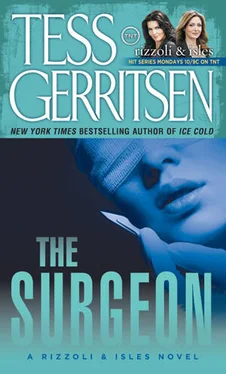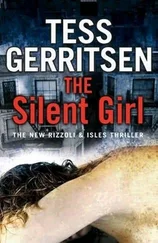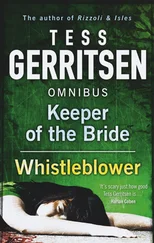“Yeah, well, if I did, I wouldn’t be the first cop to rat on a partner.”
It was a stinging comeback, and it had its intended effect. In cold silence he turned and walked away.
Stepping out of the building, he paused in the breezeway, desolate at the thought of not seeing Catherine tonight. Yet Marquette was right; this was how it had to be. How it should have been from the start, a careful separation between them, the forces of attraction ignored. But she had been vulnerable, and he, foolishly enough, had been drawn to that. After years of walking the straight and narrow, he now found himself in unfamiliar territory, a disturbing place ruled not by logic but by passion. He was not comfortable in this new world. And he did not know how to find his way out of it.
Catherine sat in her car, collecting the courage to walk into One Schroeder Plaza. All afternoon, through a succession of clinic appointments, she’d mouthed the usual pleasantries as she’d examined patients, consulted colleagues, and tackled the minor annoyances that always arose in the course of her workday. But her smiles had been hollow, and beneath her cordial mask had lurked a rip current of despair. Moore was not returning her calls, and she did not know why. Only one night together, and already something had gone wrong between them.
At last she stepped out of the car and walked into Boston Police Headquarters.
Though she had been here once before, for the session with Dr. Polochek, the building still seemed like a forbidding fortress where she did not belong. That impression was reinforced by the uniformed officer who eyed her from behind the reception desk.
“Can I help you?” he asked. Neither friendly nor unfriendly.
“I’m looking for Detective Thomas Moore in Homicide.”
“Let me call upstairs. Your name, please?”
“Catherine Cordell.”
As he made the call, she waited in the lobby, feeling overwhelmed by the polished granite, by all the men, both in uniform and in plainclothes, walking past, throwing curious glances her way. This was Moore’s universe, and she was a stranger here, trespassing in a place where hard men stared and guns gleamed in holsters. Suddenly she realized this was a mistake, that she should never have come, and she started toward the exit. Just as she reached the door, a voice called out:
“Dr. Cordell?”
She turned and recognized the blond man with the mild and pleasant face who had just stepped off the elevator. It was Detective Frost.
“Why don’t we go upstairs?” he said.
“I came to see Moore.”
“Yes, I know. I came down to get you.” He motioned toward the elevator. “Shall we?”
On the second floor, he led her up the hallway, into Homicide. She had not been in this area before, and she was surprised by how much it looked like any business office, with its computer terminals and desks grouped into workpods. He led her to a chair and sat her down. His eyes were kind. He could see she was uncomfortable in this alien place, and he tried to put her at ease.
“A cup of coffee?” he asked.
“No, thank you.”
“Is there anything I can get you? A soda? A glass of water?”
“I’m fine.”
He sat down as well. “So. What do you need to talk about, Dr. Cordell?”
“I was hoping to see Detective Moore. I spent the whole morning in surgery, and I thought that he might have tried to reach me….”
“Actually…” Frost paused, discomfort plainly in his eyes. “I left a message with your office staff around noontime. From now on, you should call me with any concerns. Not Detective Moore.”
“Yes, I got that message. I just want to know…” She swallowed back tears. “I want to know why things have changed.”
“It’s to, uh, streamline the investigation.”
“What does that mean?”
“We need Moore to focus on other aspects of the case.”
“Who decided that?”
Frost was looking more and more unhappy. “I don’t really know, Dr. Cordell.”
“Was it Moore?”
Another pause. “No.”
“So it’s not that he doesn’t want to see me.”
“I’m sure that’s not the case.”
She did not know if he was telling her the truth or simply trying to soothe her. She noticed that two detectives in another workpod were staring in her direction, and she flushed with sudden anger. Did everyone but her know the truth? Was that pity she saw in their eyes? All morning she had savored the memories of last night. She had waited for Moore to call, had longed to hear his voice and know that he was thinking of her. But he had not called.
And at noon, she’d been handed Frost’s telephoned message that in the future she should direct all concerns to him.
It was all she could do now to hold her head up and keep the tears under control as she asked: “Is there some reason I can’t talk to him?”
“I’m afraid he’s not in town right now. He left this afternoon.”
“I see.” She understood, without being told, that this was as much as he would reveal. She didn’t ask where Moore had gone, nor did she ask how to reach him. Already she had embarrassed herself by coming here, and now pride took over. For the last two years, the sheer force of pride had been her main source of strength. It had kept her marching forward, day after day, refusing to wear the cloak of victimhood. Others looking at her saw only cool competence and emotional distance, because it was all she allowed them to see.
Only Moore saw me as I really am. Damaged and vulnerable. And this is the result. This is why I can’t ever be weak again.
When she rose to leave, her spine was straight, her gaze steady. As she walked out of the workpod, she passed Moore’s desk. She knew it was his because of the nameplate. She paused just long enough to focus on the photograph displayed there, of a smiling woman, with the sun in her hair.
She walked out, leaving behind Moore’s world, and returned in sorrow to her own.
Moore had thought the heat in Boston was unbearable; he was unprepared to deal with Savannah. Walking out of the airport late that afternoon was like instant submersion in a hot bath, and he felt as though he were wading through liquid, his limbs sluggish as he proceeded toward the rental car parking lot, where watery air rippled above the macadam. By the time he checked into his hotel room, his shirt was drenched in sweat. He stripped off his clothes, lay down on the bed for just a few minutes’ rest, and ended up sleeping through the afternoon.
When he awakened, it was dark, and he was shivering in the over-cooled room. He sat up on the side of the bed, his head pounding.
He pulled a fresh shirt from his suitcase, got dressed, and left the hotel.
Even at night, the air was like steam, but he drove with his window open, inhaling the damp smells of the South. Though he’d never been to Savannah before, he’d heard of its charm, its fine old homes and wrought-iron benches and Midnight in the Garden of Good and Evil . But tonight he was not on a quest for tourist sites. He was driving to a particular address in the northeast corner of town. It was a pleasant neighborhood of small but tidy homes with front porches and fenced gardens and trees with spreading branches. He found his way to Ronda Street and pulled to a stop in front of the house.
Inside the lights were on, and he could see the blue glow of a TV.
He wondered who lived there now and whether the current occupants knew the history of their house. When they turned off the lights at night and climbed into bed, did they ever think about what had happened in that very room? Lying in the darkness, did they listen for the echoes of terror still reverberating within those walls?
Читать дальше












